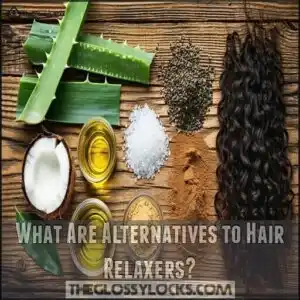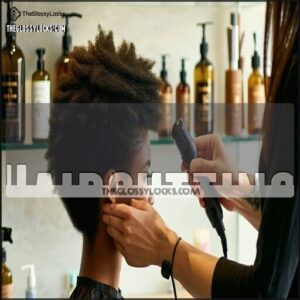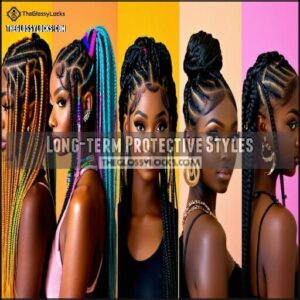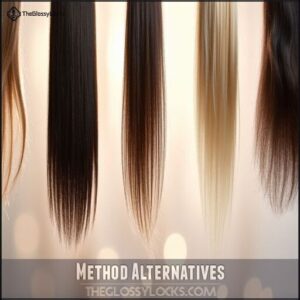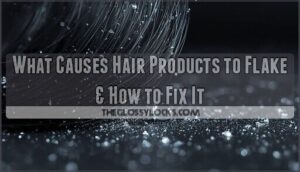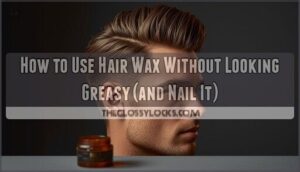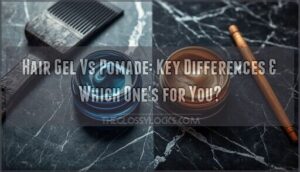This site is supported by our readers. We may earn a commission, at no cost to you, if you purchase through links.
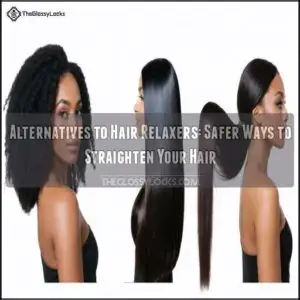
There are several options available, including keratin treatments, silicone creams, and vegetable oil alternatives.
You can also consider blow drying alternatives, like air drying or using a microfiber towel.
These alternatives to hair relaxers can help you achieve straight hair without the damage, and by exploring them, you’ll find the best method for your hair type, leading to a more natural and beautiful look that’s all yours.
Table Of Contents
- Key Takeaways
- What Are Alternatives to Hair Relaxers?
- Straightening
- Keratin Treatment
- Silicone Creams
- Vegetable Oil Alternatives
- Blow Drying Alternatives
- Haircutting
- Long-term Protective Styles
- Method Alternatives
- Frequently Asked Questions (FAQs)
- What is the best alternative to a hair relaxer?
- Are there any natural alternatives to a hair relaxer?
- How often should I use an alternative to a hair relaxer?
- Are there any side effects to using an alternative to a hair relaxer?
- How long do alternative hair relaxers last?
- Can hair relaxer damage be fully reversed?
- How often should I use natural hair masks?
- Are there any risks to using henna regularly?
- Can I use hair relaxer alternatives on colored hair?
- Do natural hair relaxers work on very curly hair?
- Conclusion
Key Takeaways
- You can ditch harsh chemical relaxers and try natural alternatives like henna, coconut oil, or shea butter to straighten your hair and promote healthier locks.
- To keep your hair healthy and manageable, consider using keratin treatments, silicone creams, or vegetable oil alternatives, which offer benefits like smoother strands, heat protection, and added shine.
- When exploring alternatives to hair relaxers, you’ll find that methods like oil treatments, heat styling, and hair extensions can provide flexibility and reduce long-term damage, so it’s worth experimenting to find what works best for your hair type.
- You should remember that everyone’s hair is different, so it’s essential to test products, follow instructions, and prioritize proper hair care to minimize risks and achieve the best results with your chosen alternative to hair relaxers.
What Are Alternatives to Hair Relaxers?
Looking for hair straightening alternatives that skip the chemicals? You’ve got options!
Ditch the chemicals and try natural hair straightening alternatives for healthier locks
Natural straightening methods like coconut oil, aloe vera, or honey nourish hair while reducing damage.
Henna benefits include stronger, shinier hair and an extra layer of protection.
Nonchemical hair relaxers, like oil treatments or braid-outs, are gentle on sensitive scalps.
Relaxer risks, including health and hair damage, make chemical-free alternatives attractive. Plus, they save money—no salon visits needed!
Embrace natural hair care for healthier, more vibrant locks, and consider the benefits of henna for your hair.
Straightening
Straight hair doesn’t have to mean exposing yourself to chemical relaxers or heat damage. There are plenty of natural straightening methods that protect your hair’s texture and keep it healthy.
Natural straightening methods keep your hair healthy and strong
Ingredients like aloe vera juice or honey aren’t just for skincare—they’re excellent for hydrating and smoothing hair, reducing the risks of relaxer damage.
Maintaining moisture is key when experimenting with hair straightening alternatives. Use a pH-balanced leave-in conditioner or light silicone cream to lock in hydration and add shine.
For styling control, try methods like braid-outs or by setting damp hair with bobby pins, giving you a polished, natural look. Many people use aloe vera products for hair care.
Here are practical tips:
- Apply aloe vera for hydration and smoothing.
- Use bobby pins to shape sleek styles while wet.
- Add honey to conditioning treatments for shine.
- Test your product sensitivity before use.
- Prioritize pH-balanced products for lasting results.
Keratin Treatment
A keratin treatment offers smoother, shinier hair while reducing damage, using amino acid straightening techniques.
Unlike harsh chemical relaxers, it focuses on strengthening strands.
Treatment longevity can last months with proper keratin aftercare, like sulfate-free shampoos.
For budget-conscious options, try an at-home keratin treatment or formaldehyde-free straightening kits.
However, consider keratin risks, including possible links to cancer.
These hair smoothing treatments require heat but are gentler than relaxers.
Ultimately, a keratin treatment enhances manageability, giving your hair lasting nourishment and strength.
These treatments can also enhance your curl pattern, making curls smoother and more defined.
Silicone Creams
Silicone creams offer a safer option for hair straightening with benefits like anti-frizz protection, heat resistance, and added shine. These creams work by smoothing strands while minimizing hair damage. For example, some silicones, like trisiloxane add shine.
- Moisture Lock-In – Silicone traps hydration, enhancing texture and combating dryness.
- Heat Protection – Shields hair during heat styling, lowering breakage risks.
- Smooth Finish – Delivers sleek, shiny results while taming frizz.
When applying, section hair, wear gloves, and follow timing instructions for safe, effective results.
Vegetable Oil Alternatives
Vegetable oils are a natural way to nourish and protect your hair, promoting scalp health and hair care without harsh chemicals.
They’re versatile for every hair type and simple for DIY blends.
Here are five popular natural oils:
- Coconut Oil: Hydrates and strengthens, reducing hair damage.
- Avocado Oil: Packed with Omega-3s for healthier strands.
- Jojoba Oil: Mimics scalp sebum for better absorption.
- Rice Bran Oil: Lightweight and fights frizz.
- Olive Oil: Locks in moisture and boosts hair health.
Try an oil treatment today!
Blow Drying Alternatives
Ditching blowdrying doesn’t have to mean losing style! Air drying combined with smart techniques can give volume and shine while protecting your hair.
Use lightweight styling products like leave-in conditioners for root lifting and frizz control. Try towel techniques, such as blotting with a microfiber towel or plopping, to soak up moisture without roughness.
Need more volume? Stand under a fan for a gentle boost. These heat-free tricks reduce damage, letting your hair shine naturally, no flat iron needed!
- Use microfiber towels for faster drying.
- Experiment with “plopping” for defined curls.
- Spritz styling products for root lift and frizz control.
Haircutting
In the pursuit of healthier alternatives to hair relaxers, haircutting offers a fresh start for your hair.
Trimming or cutting damaged ends both encourages natural growth and prevents further damage.
Techniques like layering can add movement and volume, making shorter hairstyles more versatile.
Plus, regular trims reduce split ends and frizz, which can weaken strands over time.
After a cut, embrace new styling techniques.
Experiment with hair styling tools like flat irons or curling wands on low heat.
Nourish your hair with styling products, such as argan oil, to maintain softness and shine.
With the right maintenance, cutting can prevent long-term damage while giving you the freedom to explore healthier, vibrant hair styling options, including the use of hair styling tools and regular trims to achieve natural growth and softer hair.
Long-term Protective Styles
Long-term protective styles are perfect for maintaining natural hair health while adding style versatility.
They shield your strands from daily wear and tear, prevent product buildup, and promote scalp care.
- Braids: Box, knotless, or crochet braids offer protective style longevity and reduce damage.
- Wigs: Glueless and lace-front wigs are versatile and low-maintenance.
- Twists: Two-strand twists lock in moisture and last weeks.
- Updos: Stylish buns or rolls protect ends.
- Weaves: Sew-ins shield natural hair, encouraging growth.
These options keep hair healthy and manageable!
Method Alternatives
You’ve got plenty of safer methods to straighten your hair without relying on harsh chemicals.
From oil treatments to heat styling and hair extensions, these approaches offer flexibility while reducing long-term damage.
Oil Treatments
You can use oil treatments for hair straightening, leveraging oil benefits like scalp health improvement.
Natural oils, such as avocado oil, offer various application methods, suitable for frequent treatment, promoting healthy hair care with proper oil treatment frequency, as part of your hair treatments and care products routine, which includes leveraging oil benefits.
Heat Styling
When styling with heat, consider these tips:
- Apply heat protectants
- Use temperature control
- Limit styling frequency to prevent hair damage.
Technique variations, like using a flat iron, can help with thermal styling and hair straightening techniques, reducing damage with proper heat styling.
Using quality protective products is essential for minimizing heat damage.
The key to successful styling is combining these methods with proper heat styling techniques and quality protective products.
Keratin Treatments
You can achieve silky smoothness with keratin treatments, a safer alternative to hair relaxers.
Keratin longevity and at-home options make it appealing, addressing formaldehyde concerns and hair damage, while improving hair texture and overall hair health with formaldehydefree straightening.
Considering treatment costs is also an important aspect of keratin treatments.
Silicones
Keratin treatments offer lasting smoothness, but what about other options? You might consider silicone creams. Silicone benefits include a smooth feel. Silicone application is simple, but silicone drawbacks exist.
- Frizz-free days
- Effortless styling
- Increased manageability
- Boosted confidence
Silicone types vary. While silicones add shine, they can cause hair damage over time. Silicone alternatives exist for better hair health. Weigh the pros and cons before choosing silicone hair products.
Extensions, Weaves, and Wigs
You can boost your look with extensions, weaves, and wigs.
| Extension | Weave | Wig |
|---|---|---|
| Sewin | Hair volume | Synthetic |
| Clipon | Hair thickness | Human hair |
| Tapein | Scalp health | Blend |
Consider extension maintenance and weave installation for styling options, ensuring scalp health with the right wig materials.
Many people also explore options for adding extra volume to their hair.
Frequently Asked Questions (FAQs)
What is the best alternative to a hair relaxer?
You can consider henna, a natural alternative, to achieve thicker, stronger, and shinier hair without harsh chemicals, promoting healthier hair and scalp.
Are there any natural alternatives to a hair relaxer?
You can try natural alternatives like henna, coconut oil, or shea butter to straighten hair without harsh chemicals, promoting healthier hair and scalp.
How often should I use an alternative to a hair relaxer?
In the event of crunch time, use alternatives to hair relaxers 1-2 times a week, depending on your hair type and desired level of straightness or styling flexibility.
Are there any side effects to using an alternative to a hair relaxer?
You may experience mild side effects, such as dryness or irritation, when using alternatives to hair relaxers, but these are generally less severe than chemical relaxer side effects.
How long do alternative hair relaxers last?
Like a fresh haircut, alternative hair relaxers can last, you’ll find they typically endure several weeks, depending on hair type and treatment method, offering a longer-lasting solution.
Can hair relaxer damage be fully reversed?
You can reverse some hair relaxer damage with proper care, but extensive damage may be irreversible, requiring professional treatment to restore hair health.
How often should I use natural hair masks?
As you begin a hair care journey, use natural hair masks once or twice a week to nourish and moisturize your locks, promoting healthy growth and shine.
Are there any risks to using henna regularly?
You should be aware that regular henna use can cause dryness, itchiness, and allergic reactions in some individuals, so patch testing is recommended before frequent application.
Can I use hair relaxer alternatives on colored hair?
Variety is the spice of life" – you can use henna, natural oils, or gentle treatments on colored hair, but test products first to guarantee compatibility and minimal damage.
Do natural hair relaxers work on very curly hair?
You can use natural hair relaxers on very curly hair, as they gently loosen curls without harsh chemicals.
They are a great option for curly-haired individuals seeking softer, more manageable locks.
Conclusion
Considering alternatives to hair relaxers, you’ll find safer ways to straighten your hair.
For example, a woman with curly hair might use keratin treatments.
By exploring these alternatives to hair relaxers, you’ll achieve straight hair without damage, leading to a more natural look with the right method for your hair type.
- https://www.nih.gov/news-events/news-releases/hair-straightening-chemicals-associated-higher-uterine-cancer-risk
- https://www.pbs.org/newshour/health/25-year-long-study-of-black-women-links-frequent-use-of-lye-based-hair-relaxers-to-a-higher-risk-of-breast-cancer
- https://blog.uvahealth.com/2023/03/09/hair-relaxers-uterine-cancer-linked/
- https://www.consumerreports.org/search/?query=Straighteners

